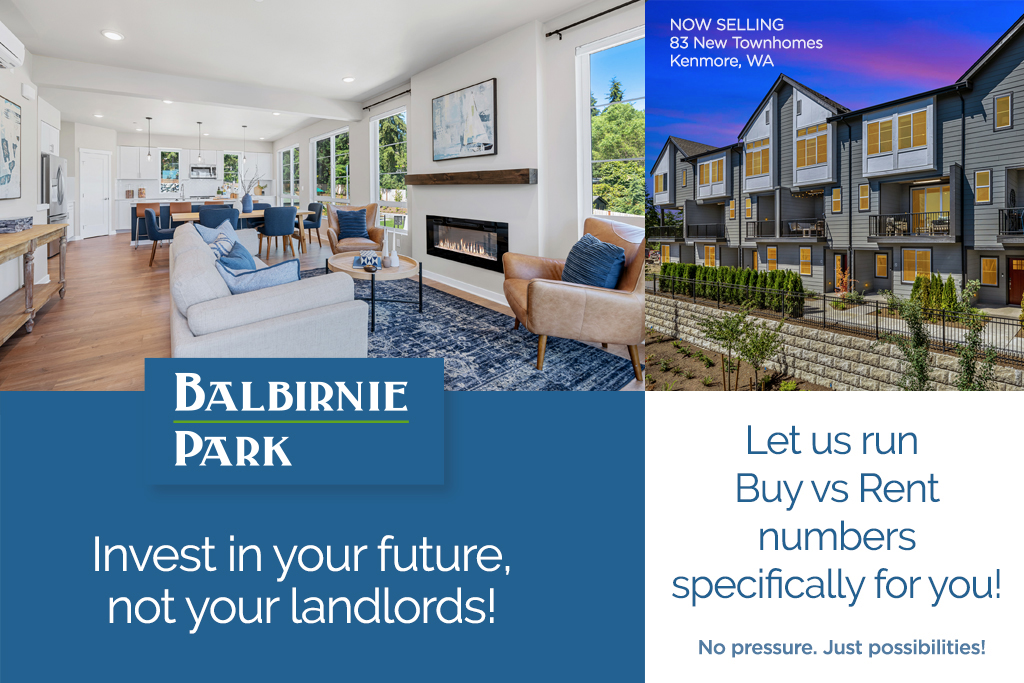You’ve been able to save up a little and you have a steady income — the next big step is to decide whether buying versus renting makes sense for your next move.
There are a lot of assumptions about buying versus renting that keep people stuck in their rentals, but many of these assumptions are simply untrue. In this post, we’re going to cover the top 5 reasons why buying versus renting is a smart move for many people.
#1. Owning a Home is the Next Big Step
Owning a home is a big financial responsibility, but it also marks a new chapter in your life. As you become more financially stable, it’s time to get serious about your financial future, and buying a home is the first step toward setting yourself up for financial success.
Purchasing a home is the ultimate move towards independence. Not only do you gain independence from roommates or parents, but you also gain financial independence from landlords. If you’re weighing costs when it comes to whether buying versus renting makes sense, consider that mortgage rates don’t typically fluctuate as much as rent.
When you purchase a home, you won’t have to fear sudden increases in rent every year, and you can feel secure knowing that you always have a place to live and a predictable monthly living expense.
#2. You Don’t Need to Have 20% in Cash for a Down Payment
When it comes to deciding whether buying versus renting makes financial sense, a lot of people view the down payment as the biggest obstacle. Saving for a down payment doesn’t have to be as difficult as you may think. Although you’ve likely been told that you need to have a full 20% in cash saved for a down payment, that is simply not true.
Special loans for first-time buyers, like an FHA or VA loan, require as little as 3.5% down payment. In addition, some states have special programs that help you come up with the few thousand you need to put in the minimum down payment.
Keep in mind that securing a mortgage loan with less than 20% down often means you need to pay an extra cost every month in the form of mortgage insurance. Given the high rental prices at the moment, however, this extra cost can still put your total mortgage payment lower than what you’re currently paying in rent. And with most loans, once you reach 20% equity, you don’t have to pay the extra cost anymore.
If putting 20% down payment is a significant factor in your buying versus renting debate, then we highly recommend you do a little research to see what loan you can get approved for that doesn’t require such a high down payment. The options are there!
#3. Your First Home Doesn’t Have to Be Perfect
After many years of having no control over your interior design, many long-term renters dream of what their first home will look like. Then the reality hits of what they can truly afford, and it isn’t anywhere near their dream.
It can be tempting to continue renting and wait until you can afford your absolute dream home, but every year that you rent pushes you further and further from that dream.
Your first home does not have to be your forever home, and it does not have to be perfect. Smaller starter homes are perfect opportunities for first-time homeowners to invest in their financial future. Starting with something low maintenance, like a townhome, ensures that you aren’t throwing thousands of dollars into renovations. Your first home does not have to be the last place you will ever live in.
Also, consider that what your dream home is can change according to what phase of life you’re in. Maybe when you’re in your 20s, your dream is to purchase and renovate an old Victorian home, but when you’re older and have a family, you might prefer the modern conveniences of a new build. If you’re trying to decide whether buying versus renting is best for you, letting go of the vision of a dream house will make it clear that buying is the smart move.
#4. Buying Versus Renting Makes Financial Sense
Buying a home is a significant investment that will set you up for future financial success. The longer you live in your first home, the more you will gain equity. Equity is the difference between how much your house is worth vs how much you owe on your mortgage. The longer you own your home, the more equity you build. The equity that you gain in your first home can be the down payment for your dream forever home.
When you rent a house, the money that you spend on rent is not being invested in anything (except for your landlord’s equity). Buying versus renting makes more sense financially.
5. Mortgage Interest Rates are Still Reasonable
It can be disheartening to look at the record lows of mortgage rates in 2020 and 2021 and feel like you’ve missed out on your window of opportunity to buy a house. The reality is that mortgage rates today are still reasonable and are nowhere near the highest they’ve ever been in the past 20 years.
Mortgage rates constantly fluctuate and can very well continue to increase. That means that if you wait to purchase a home, you may be faced with even higher mortgage rates. Many organizations try to predict what the mortgage rates will be, but the truth is that we do not know. Therefore, it makes sense to look at the rates today when deciding whether buying versus renting is right for you, not to look at what the rates could be.
Remember that you can always refinance your mortgage if and when rates get lower, but if you secure a mortgage at an all-time low rate, it’s unlikely that refinancing will make as much sense.
If you’re wondering if buying versus renting is for you, don’t disqualify yourself based on faulty assumptions.
Let Westcott run the numbers to see how much you could potentially save by buying versus renting. Schedule a tour today!
Westcott Homes offers modern living and smart design for today’s active families, in neighborhoods with room to grow. Our flexible floorplans, durable Pacific Northwest exteriors and luxurious interior details add up to a home you’ll delight in every day, and for years to come.








